Muhammad Ali - A champion in the struggle for freedom, justice and equality
By Richard B. Muhammad and Starla Muhammad -Final Call Staffers- | Last updated: Jun 7, 2016 - 9:32:29 AMWhat's your opinion on this article?
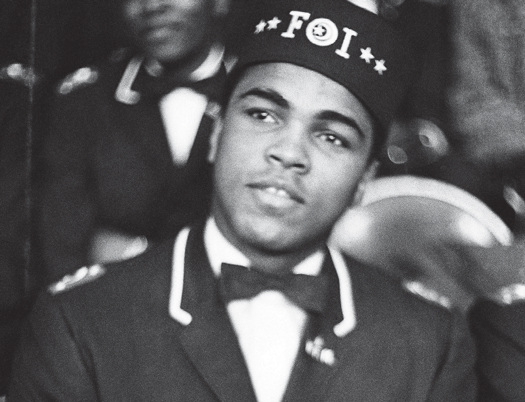
Muhammad Ali, heavyweight champion sits at Muslim meeting in Chicago February 26, 1967, as Elijah Muhammad, leader of the religious sect addresses some 10,000 members in Illinois. Photo: AP/Wide World photos
|
The physical passing of the man known worldwide as Muhammad Ali captured media attention and inspired tributes around the planet.
The honors and accolades were the triumph that followed the life of a man who stood for his beliefs, his faith and his people.
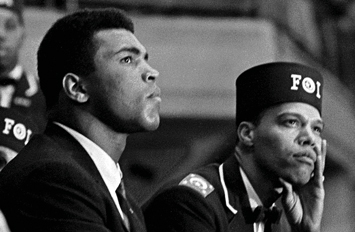
Close-up of American boxer Muhammad Ali (left) and Nation of Islam leader Louis Farrakhan as they listen to a speaker during the Saviour’s Day celebrations at the International Ampitheatre, Chicago, Illinois, February 27, 1966. Farrakhan wears a Fruit of Islam uniform, a subset of the Nation of Islam. Photo: Robert Abbott Sengstacke/Getty Images
|
While the heavyweight boxing champion and Olympic gold medal winner may have changed some in his beliefs and went on to broad humanitarian work, it was his stand as a Muslim in the Nation of Islam that brought him love and respect among his own people and the darker peoples of the earth. It brought hatred from White America and Caucasian people.
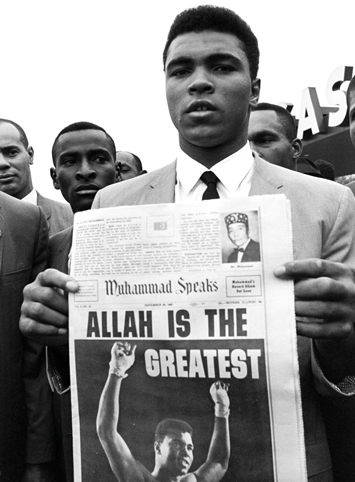
Heavyweight champion Muhammad Ali, holds the “Muhammad Speaks” newspaper after weigh-in ceremonies November 22, 1965, in Las Vegas. Photos: AP/Wide World photos
|
“His being an outspoken Black man was a direct threat to White America. All of the Black students wanted him to win, White students in general wanted Liston. I think what Ali did, I mean he was totally unafraid, speaking his mind and in that sense spoke the mind of most Black Americans living at that time,” said Dr. Winbush.
“He said what we either couldn’t say because we’d get fired, wouldn’t say because we are afraid but in our hearts we knew what he was saying was absolutely correct and we felt that he was giving that famous left jab not only to his opponents but to White America in general.”
Refusing to bow to the White world
He was born Cassius Marcellus Clay, Jr., in 1942 and his training as a boxer followed the theft of his bicycle. Vowing to beat the thief talking to police officer Joe Martin, he was advised to learn how to fight first. He did. Starting with Mr. Martin, who was also a youth boxing coach, winning junior titles, then a gold medal in the 1960 Olympics.
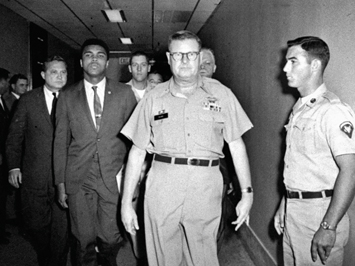
In this April 28, 1967 file photo, heavyweight boxing champion Muhammad Ali is escorted from the Armed Forces Examining and Entrance Station in Houston by Lt. Col. J. Edwin McKee, commandant of the station, after Ali refused Army induction. Ali says he was a conscientious objector who would not serve in the Army of a country that treated members of his race as second-class citizens.
|
But he grew up and lived in the South and felt the degradation heaped on Blacks. In his 1975 autobiography, he wrote of returning to American segregation after his Olympic victory and throwing away his gold medal in disgust.
He became world heavyweight boxing champion February 25, 1964 by knocking out reigning champ Sonny Liston.
After winning the Liston fight, the new champion announced he had accepted Islam and was a follower of Elijah Muhammad. His name would be Cassius X until a little later in 1964 when he was given his “holy name” by Messenger Muhammad. News reporters had been buzzing about seeing Black Muslims, including Minister Malcolm X, by the boxer’s side.
His name change, stand with Mr. Muhammad and stand against White supremacy and U.S. racial hypocrisy brought hate mail and death threats.
But Muhammad Ali’s boldness, confidence, discipline and greatness was cultivated in the ranks of the Nation of Islam as a follower of the Honorable Elijah Muhammad, pointed out author and educator Ishmael Reed during a June 6 interview on Democracy Now with Amy Goodman.
“I think that not enough attention has been given to the influence of the Nation of Islam on Muhammad Ali. You played some of his speeches. Those speeches were taken right out of Elijah Muhammad’s Message to the Blackman. So I think that this is the great flaw in what I’m hearing from commentators about his death, is that without the Nation of Islam, nobody would have ever heard of Muhammad Ali,” said Mr. Reed, author of “The Complete Muhammad Ali,” published in 2015.
If there was a refusal to speak honestly about this champion Ali in the media, it follows the same pattern of yesterday’s media. In 1971, some seven years after announcing himself to the world as Muhammad Ali, a cover story in Ring magazine asked, “What’s Clay’s future?” It was a clear sign of White disdain.
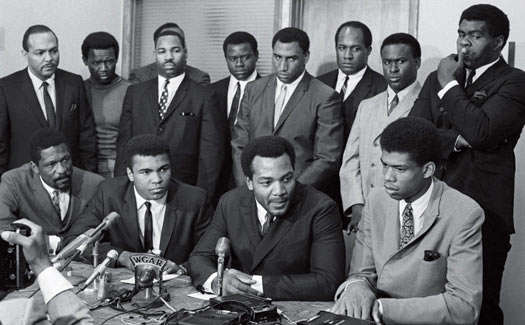
Muhammad Ali, of the Nation of Islam, shared his reasons for refusing the draft during the Vietnam War at a meeting of the Negro Industrial and Economic Union in Cleveland on June 4, 1967. Seated in the front row, from left to right: Bill Russell, Muhammad Ali, Jim Brown, and Kareem Abdul Jabbar. Standing behind them are: Carl Stokes, Walter Beach, Bobby Mitchell, Sid Williams, Curtis McClinton, Willie Davis, Jim Shorter, and John Wooten. These professional athletes, which included sports hall of famers, stood with the boxer who was outspoken on racism and issues that impacted Black America. Photos: AP/Wide World photos
|
The person perhaps punished most for disrespecting the Muslim fighter was former heavyweight boxing champion Ernie Terrell. He refused to recognize the name Muhammad Ali, referring to his opponent as “Clay.” The fight Feb. 6, 1967 saw the 6-foot 6-inch boxer pummeled in combination with an oft-repeated question, “What’s my name?”
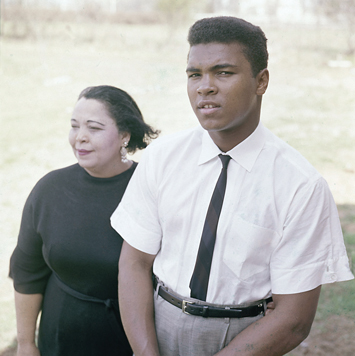
Young boxer Muhammad Ali is seen with his mother, Odessa Grady Clay, April 2, 1963, at an unknown location.
|
Yet none of this was recited by White media and White people telling the life story of Muhammad Ali after his death.
Munir Muhammad of the Chicago-based Coalition for the Remembrance of the Honorable Elijah Muhammad was outraged by the attempt to whitewash the life of the Black champion.
But he didn’t fume about it; he took to the airwaves June 5 through CROE-TV, streaming online original videos of Muhammad Ali paying homage to his teacher at various stages of his career and defeating newsmen and TV hosts who tried to turn him against his teacher.
The interviews range from Dick Cavett to an encounter with a Black reporter, as young Muslim declares that he loves his name because it was given to him by his leader and teacher. “I sign autographs with that name, I will fight under that name and that name is the Original name of our people and names of the Black people in Africa and Asia,” Mr. Ali said.
Media white washing a powerful legacy?
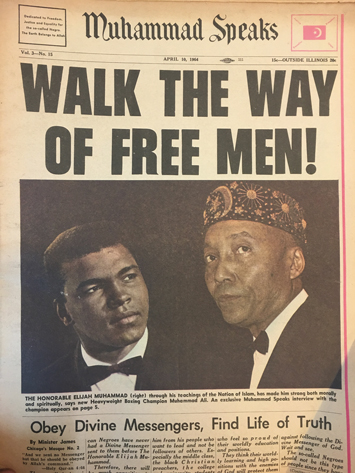
|
Messenger Muhammad has been taken out of the whole equation and they want to suggest the young Muslim boxer was brainwashed, said Munir Muhammad. If such brainwashing produces what happened to Mr. Ali, there are plenty would need to have their brains scrubbed, he said. Mr. Ali traveled the world and testified to the value of the Honorable Elijah Muhammad and what that man meant to his life, Munir Muhammad pointed out. And he has the video evidence, photos, newspapers and audio recordings to back up what he says. C.R.O.E. serves as an archive, repository and protector of the words and legacy of Messenger Muhammad.
Mr. Ali told one TV host, he would never denounce his teacher.
“They just stole our history and people quietly accept it,” said Munir Muhammad. “I’m so glad we have The Final Call, the Minister (Farrakhan) and we are still here to talk about it.”
The failure to tell the truth about Muhammad Ali’s history is part of ongoing efforts to destroy the name and work of Elijah Muhammad, he added.
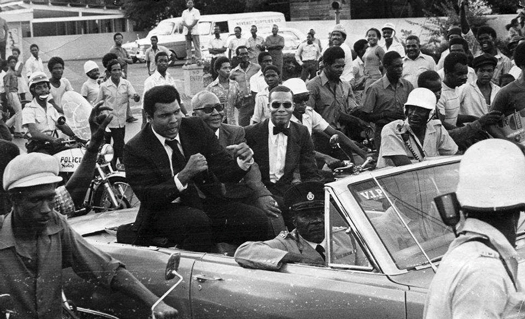
Muhammad Ali, Jam Muhammad, the Honorable Elijah Muhammad’s brother and Min Farrakhan during historic trip to Jamaica in 1974.(Photo courtesy of Carlos Muhammad - NOI Archives).
|
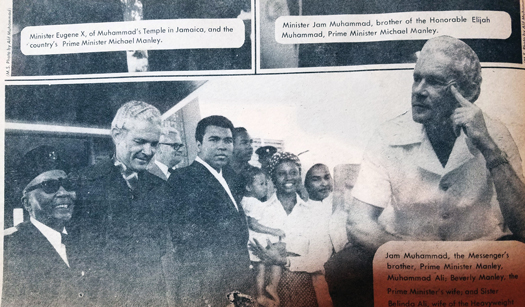
Jamaican Prime Minister Michael Manley and Muslim delegation.
|
The media and Whites admit the Vietnam War was wrong now and that Mr. Ali was right not to fight, Munir Muhammad pointed out. But, he said, that consciousness came from the Honorable Elijah Muhammad. That the world champion could deal with White people and care about the plight of people around the world shows he was a civilized human being, which is what the Teachings of the Honorable Elijah Muhammad produces, Munir Muhammad said.
When Oprah Winfrey in O Magazine tried to get Mr., Ali to reject Elijah Muhammad, he refused, Munir Muhammad said.
*His teacher took time with Muhammad Ali, like a father spends with his son and the student was not a thief and would not steal from his teacher, he added.
It requires a special patience to sit and teach young people and the Honorable Elijah Muhammad did it yesterday with Muhammad Ali and Min. Farrakhan does it today with young people, rappers and entertainers, he said.
And in an era where America seems to be in the mode of perpetual war, there are lessons for young people and entertainers today about standing for what is right.
***image3**“In an era defined by endless war, we should recognize a day in history that won’t be celebrated on Capitol Hill or in the White House. On June 20, 1967, the great Muhammad Ali was convicted in Houston for refusing induction in the U.S. armed forces,” wrote Dave Zirin in “When Muhammad Ali Took the Weight,” written as part of his Teaching A People’s History Zinn Education Project.
“Ali saw the war in Vietnam as an exercise in genocide. He also used his platform as boxing champion to connect the war abroad with the war at home, saying, “Why should they ask me to put on a uniform and go 10,000 miles from home and drop bombs and bullets on Brown people in Vietnam while so-called Negro people in Louisville are treated like dogs?”
“For these statements, as much as the act itself, Judge Joe Ingraham handed down the maximum sentence to “Cassius Clay” (as they insisted upon calling him in court): five-years in a federal penitentiary and a $10,000 fine. The next day, this was the top-flap story for The New York Times with the headline, Clay Guilty in Draft Case; Gets Five Years in Prison.”
“The sentence was unusually harsh and deeply tied to a Beltway, bipartisan consensus to crush Ali and ensure that he not develop into a symbol of anti-war resistance. The day of Ali’s conviction the U.S. Congress voted 337-29 to extend the draft four more years. They also voted 385-19 to make it a federal crime to desecrate the flag. Their fears of a rising movement against the war were well-founded.
“The summer of 1967 marked a tipping point for public support of the Vietnam ‘police action.’ While the Tet Offensive, which exposed the lie that the United States was winning the war, was still six months away, the news out of Southeast Asia was increasingly grim. At the time of Ali’s conviction, 1,000 Vietnamese noncombatants were being killed each week by U.S. forces. One hundred U.S. soldiers were dying every day, and the war was costing $2 billion a month.
“Anti-war sentiment was growing and it was thought that a stern rebuke of Ali would help put out the fire. In fact, the opposite took place. Ali’s brave stance fanned the flames,” he wrote.
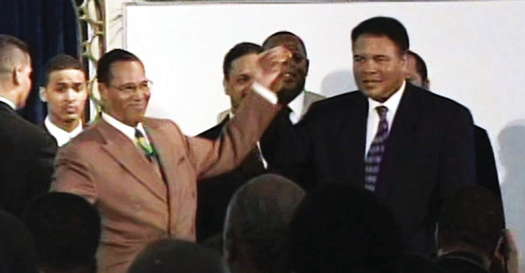
Min. Farrakhan welcomes Muhammad Ali to Mosque Maryam in 2002.
|
Mr. Ali refused to fight because of his beliefs as a Muslim and toured speaking out against the war. Other rallied to his defense including Dr. Martin Luther King, Jr., and major press conference was held in June 4, 1967 Cleveland. Top Black sports figures took a courageous stand with Muhammad Ali, with Jim Brown, Bill Russell, Lew Alcindor, who later became Kareem Abdul Jabbar, and others convinced the boxing champion was for real in his religious convictions. He was. They were convinced and these incredible Black men with fame, money and star power stood with him.
Mr. Ali never wavered, asserting that he would rather face machine guns and firing squad than abandon his belief and desert his teacher, who was jailed during World War II. Too old be drafted, the federal government locked Elijah Muhammad up anyway.
The U.S. Supreme Court eventually overturned the unjust Ali conviction in June 1971.
Though deprived of his prime years as an athlete, he would regain the world heavyweight championship, defeating undefeated heavyweight champion George Foreman in 1974.
Zaheer Ali said in the midst of the current Black Lives Matter movement and the rise of Islamophobia, Muhammad Ali’s roots cannot be ignored. It’s really important to remember that Muhammad Ali was unapologetically Black and Muslim and that that shaped his Black Islam and I want to say Black Islam. He would later of course move toward traditional Sunni Islam but it was his Black Islam with its roots in Black Nationalism and the theology of Elijah Muhammad that shaped his emergence in the 1960’s, Mr. Zaheer Ali told Joy Reid on MSNBC.
“Even his appellation of ‘I am the greatest’ was drawn out of the theology of the Nation of Islam that identified Allah, God as a Black man and so where people saw boastfulness and arrogance, it was a deeply theological framework out of which Ali was emerging,” said Mr. Ali during the June 4 interview.
Thomas Jehad became a follower of the Honorable Elijah Muhammad in 1953 as a young, 17 year old. He first met the boxing great, still known as Cassius Clay, in St. Louis when he traveled there to see and hear the Honorable Elijah Muhammad sometime between 1960 and 1961. His first impressions of the young man from Louisville were that he was nothing like media reports made him out to be.
“He was kind, he was courteous, he was dying to hear the Honorable Elijah Muhammad. He was 180-degrees of what the press had printed him to be,” said the longtime Nation of Islam pioneer.
Muhammad Ali was very humble, outside of the peering and intrusive eyes, microphones and cameras of the press, explained Mr. Jehad who was also a conscientious objector during America’s wars.
Supporting the justice for Native Americans
Muhammad Ali was also an advocate and supporter of Native American and Indigenous tribes said Yonasda Lonewolf whose late mother, Wauneta Lonewolf, was an Oglala Sioux activist. She began working as a public relations director for Muhammad Ali after meeting the boxing great and Don King at an event in New York while working for NBC in the 1970s.
“She introduced herself as Wauneta Lonewolf and he looked at her and said ‘Pocahontas’ and that’s what he called her, that was a nickname he gave her,” said Yonasda Lonewolf. Her mother worked as the PR director until 1981 after Muhammad Ali’s last fight.
In 1978 while pregnant with her daughter, Wauneta Lonewolf asked the champion fighter to participate in The Longest Walk, a protest march by the American Indian Movement from Alcatraz, Calif. to Washington, D.C. “So he was a part of that walk, with that movement. He gave a lot of aid and help to Native people,” said Yonasda Lonewolf.
She credits Muhammad Ali for giving her mother, a Native woman from the reservation in Pine Ridge, South Dakota, the opportunity to travel the world and much more. “If it wasn’t for him she wouldn’t have gotten a chance to know who the Honorable Elijah Muhammad was. She wouldn’t have gotten a chance to know Islam and most importantly, she wouldn’t have gotten a chance to meet or know who the Honorable Minister Louis Farrakhan is.”
“America didn’t see Muhammad Ali as a hero when he stated facts on racism and white supremacy,” writer Evette Dionne, observed on Twitter. “Now, Americans are erasing him from his Blackness to offer a universal hero narrative. That’s disrespectful to his legacy.”
Thomas Jehad added that it is critical that people understand that it was Abdul Rahman Muhammad (formerly Captain Sam X Saxon) who first brought a young Cassius Clay to the Nation of Islam temple in Miami, Florida. Mr. Jehad said there is love for Minister Malcolm X for the good that he has done.
“They say Malcolm converted him, but Muhammad Ali was a follower of the Honorable Elijah Muhammad. If what they’re saying is true then why didn’t Muhammad Ali follow Malcolm when Malcolm left (the Nation of Islam)?” asked Mr. Jehad, who also added that it is not true that Muhammad Ali left the Nation of Islam.
“Muhammad Ali was a follower of the Honorable Elijah Muhammad until February 25, 1975 when the Messenger departed and he was a staunch follower of the Honorable Elijah Muhammad. It was Imam Warith Deen Muhammad who took the Nation into Sunni Islam which he called Al-Islam and that’s when Ali became a Sunni Muslim.”
Mr. Ali’s eloquence, impact and legacy arose from his truth telling, said Dr. Winbush. “Sometimes our eloquence just arises because we know how to talk but his came directly out of he knew what truth was and Black folk applauded it.”
Muhammad Ali departed this life June 3, 2016 in Phoenix, Ariz, according to a family spokesperson. He had suffered from Parkinson’s disease since 1984, but his suffering brought attention and funding for a cure. He helped raise money with the Muhammad Ali Parkinson Center in Phoenix, Arizona.
By the time of his passing the country that once rejected him was forced to honor him: In 1996, he lit the Olympic Torch at the Summer Olympic Games in Atlanta. He was recipient of the Presidential Medal of Freedom from President George W. Bush and attended the 2009 inauguration of Barack Obama, the first Black president. He has received countless awards from the NAACP and other groups and was a United Nations Messenger For Peace. In Louisville, the Muhammad Ali Center tells his official story. Mr. Ali is survived by his fourth wife, Yolanda. They married in 1986 and have a son, Asaad. His is also survived by nine children from his previous marriages and his daughter, Laila Ali, became a successful boxer in her own right.
Special thanks to Student Minister Carlos Muhammad, Muhammad Mosque Number 6 in Baltimore and NOI archivist, Muni Muhammad and the Coalition for the Rememberance of the Honorable Elijah Muhammad (C.R.O.E.) and Anthony Shahid of the Tauheed Youth Group in St. Louis, MO for sharing your images and research. They were invaluable contributions to this edition.
INSIDE STORIES AND REVIEWS
-
-
About Harriett ... and the Negro Hollywood Road Show
By Rabiah Muhammad, Guest Columnist » Full Story -
Skepticism greets Jay-Z, NFL talk of inspiring change
By Bryan 18X Crawford and Richard B. Muhammad The Final Call Newspaper @TheFinalCall » Full Story -
The painful problem of Black girls and suicide
By Charlene Muhammad -National Correspondent- » Full Story -
Exploitation of Innocence - Report: Perceptions, policies hurting Black girls
By Charlene Muhammad -National Correspondent- » Full Story -
Big Ballin: Big ideas fuel a father’s Big Baller Brand and brash business sense
By Bryan Crawford -Contributing Writer- » Full Story






 Click Here Stay Connected!
Click Here Stay Connected!








